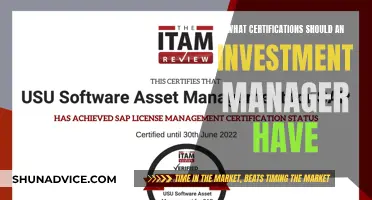
The Certified Investment Management Analyst (CIMA) certification is a valuable credential for financial professionals. It showcases their advanced skills and knowledge, and their commitment to advancing their careers. The CIMA designation is ideal for those who want to become investment professionals, such as investment consultants, portfolio managers, or analysts. To obtain the CIMA certification, candidates must meet certain requirements, including work experience, a degree, passing an exam, and continuing their education. The certification provides improved professional credibility, networking opportunities, and access to more educational opportunities.
| Characteristics | Values |
|---|---|
| Credential | Certified Investment Management Analyst (CIMA) |
| Purpose | Showcases financial experts' advanced skills and knowledge, and their commitment to advancing their career |
| Ideal for | People who want to become investment professionals, including working as an investment consultant, portfolio manager or analyst |
| Knowledge & Skills | Financial reporting, costing, performance management, strategy formulation, financial markets, analytics, communication, accounting principles |
| Requirements | 3 years of work experience in finance and investment management; a bachelor's degree in finance or economics; pass an exam; complete 40 hours of continuing education every 2 years |
| Benefits | Improved professional credibility; networking opportunities; access to more education opportunities |
What You'll Learn

Gain experience: 3 years in finance and investment management
Gaining experience in finance and investment management is a crucial step on your path to becoming a Certified Investment Management Analyst (CIMA). Here are some strategies to help you achieve that goal:
Internships and Part-time Jobs
Seek out internships or part-time jobs within the finance industry. Many financial institutions offer internships that provide valuable hands-on experience and industry knowledge. Working at a bank, for example, can offer multiple career benefits, including flexible hours for students, competitive pay, and practical work experience that will enhance your resume.
Education and Qualifications
Obtaining a bachelor's degree in a relevant field is typically the first step towards gaining experience in finance and investment management. Consider majoring in business, economics, finance, or accounting. You can further enhance your qualifications by pursuing a master's degree in a specialised field, such as an MBA with a quantitative focus or a master's in finance.
Networking and Mentorship
Building a strong professional network is essential in the finance industry. Join trade groups like the Financial Planning Association to connect with other professionals and stay informed about industry trends. Additionally, consider finding a mentor in the financial sector, preferably someone working in your desired role. A mentor can provide valuable insights, feedback, and guidance as you navigate your career path.
Entry-level Positions
Don't be afraid to start with entry-level positions that match your current skill level. This will allow you to gain experience and showcase your unique skills within a financial institution. Entry-level roles often provide opportunities to learn the internal workings of the company and develop relationships with colleagues, increasing your chances of advancement.
Continuous Learning
Stay committed to continuous learning and skill development. Keep yourself updated with the latest trends, issues, and developments in the financial industry. Develop your analytical and quantitative skills, such as statistics, mathematics, and financial modelling. Additionally, consider pursuing additional certifications, such as the Chartered Financial Analyst (CFA) designation, which is highly valued by employers.
Remember, gaining experience in finance and investment management takes time and dedication. Be persistent and proactive in your job search, and don't hesitate to take on new challenges and responsibilities that will enhance your skill set and make you a strong candidate for CIMA certification.
Understanding the Efficient Frontier: Maximizing Investment Portfolio Returns
You may want to see also

Attain a degree: Bachelor's in finance or economics
To become a Certified Investment Management Analyst (CIMA), you must meet the minimum educational requirement of a bachelor's degree in finance or economics from an accredited university. This degree will provide you with a solid foundation of knowledge in financial reporting, costing, performance management, and strategy formulation, which are essential skills for a career in investment management.
When choosing a bachelor's degree program, consider institutions that offer a curriculum with a strong quantitative focus and analytical component. Courses in business, finance, accounting, economics, statistics, mathematics, physics, or engineering can provide a solid foundation for a career in investment management analysis.
It is important to note that while a bachelor's degree is the minimum requirement, some employers may prefer candidates with master's degrees or other advanced degrees. Relevant graduate degrees could include a Master of Business Administration (MBA) with a quantitative focus or a master's degree in finance. These additional degrees can enhance your knowledge and skills, making you a more competitive candidate in the job market.
Additionally, gaining relevant work experience during or after your bachelor's degree program is advantageous. The CIMA credential specifically requires three years of work experience in finance and investment management, and candidates can count up to two years of full-time education towards this requirement.
By attaining a bachelor's degree in finance or economics, you will be well on your way to fulfilling the educational requirements for becoming a Certified Investment Management Analyst. This degree will provide you with the necessary knowledge and skills to succeed in the field and set you up for further advancement in your career.
Managing Investment Risk: Strategies for Success
You may want to see also

Pass an exam: Up to 5 hours, covering investment management
To become a Certified Investment Management Analyst (CIMA), you must pass the CIMA certification exam. The exam is proctored and can be taken online or in person. It is a timed exam that lasts up to 5 hours. The CIMA exam is designed to test your ability to apply a balance of theory and practical knowledge to provide insightful guidance, portfolio construction, portfolio management, and risk management for individual and institutional clients.
The exam consists of multiple-choice questions that evaluate your knowledge and skills at various levels. Recall questions test your ability to recognize and remember specific facts, generalizations, theories, and principles. Application questions assess your ability to use your knowledge in different situations, while analysis questions require you to synthesize your knowledge and develop effective solutions or recommendations.
The CIMA exam covers a range of topics, including:
- Statistics and Methods
- Applied Finance and Economics
- Global Capital Markets
- Alternative Investments
- Options, Futures, and Other Derivatives
- Behavioral Finance, Portfolio Theory, and Construction
- Portfolio Theories and Asset Pricing Models
- Behavioral Finance Theory
- Investment Philosophies and Styles
- Portfolio Construction
- Performance Analysis
- Risk Concepts and Measurement
- Performance Measurement and Attribution
- Portfolio Implementation and Consulting Process
- IWI Code of Professional Responsibility
- Client Discovery and Investment Policy Statements
- Investment Policy Statements
- Investment Implementation Approaches
- Manager Search, Selection, and Monitoring
- Portfolio Review and Revisions
It is recommended that you allow for several hours of preparation before taking the exam.
Cloud Computing: Transforming the Future of Investment Management
You may want to see also

Continuing education: 40 hours every 2 years
Continuing education is a critical aspect of maintaining your Certified Investment Management Analyst (CIMA) designation. To retain your certification status, you must complete 40 hours of continuing education every two years. This requirement ensures that you stay up-to-date with the latest trends and developments in investment and finance, enabling you to provide informed and effective advice to your clients.
The Investments and Wealth Institute offers several ways to fulfil this requirement. You can earn up to six hours annually by attending meetings and events organised by the Institute. Additionally, you can gain credits by reading publications and taking online courses from approved providers. Self-study and mentoring programs can also contribute up to three credits per year towards your continuing education requirement.
The continuing education programs offered by the Institute help you maintain your expertise in critical areas of investment management. These include portfolio management, asset allocation, risk management, and performance measurement. By regularly updating your knowledge and skills, you can be confident in your ability to provide valuable insights and strategies to your clients, helping them to grow and manage their wealth effectively.
The CIMA designation is highly regarded in the financial industry, and maintaining your certification through continuing education enhances your professional credibility. It demonstrates your commitment to staying informed and adaptable in a dynamic financial landscape. This commitment is recognised by employers and clients alike, opening doors to new career opportunities and helping you establish yourself as a trusted expert in your field.
In addition to the practical benefits, continuing education also provides valuable networking opportunities. By participating in meetings, events, and mentorship programs, you can connect with peers and industry experts. These connections can foster collaborative relationships, provide new insights, and potentially lead to exciting career advancements.
Aggressive Investment Portfolio: High-Risk, High-Reward Strategy
You may want to see also

Skills: Financial markets, analytics, communication, accounting principles
Financial Markets
Financial analysts need to be well-versed in financial markets and industry trends to identify patterns, opportunities, and risks. They study macroeconomic and microeconomic conditions, company fundamentals, and market trends to make informed recommendations about investment opportunities. Analysts must also stay updated on current news, market trends, and changes in finance rates, such as interest rates, to contribute to decision-making effectively.
Analytics
Analytics is a critical skill for financial analysts. They need to be proficient in financial modelling, data analytics, and portfolio management. Modelling helps analysts visualise a company's financial health and predict future performance. Data analytics enables them to identify trends and solve problems using raw data. Portfolio management involves building investment strategies, measuring investment risks and performance, and tailoring portfolios to individuals or organisations.
Communication
Effective communication is essential for financial analysts. They must convey complex financial strategies and recommendations to clients and stakeholders. Strong communication skills also help analysts in their interpersonal interactions with colleagues, investors, and management teams. Clear and concise communication ensures that analysts can report their findings and insights to superiors persuasively.
Accounting Principles
A solid understanding of accounting principles and practices is crucial for financial analysts. They should be knowledgeable about accounting standards, techniques, and financial formulas. Analysts often use accounting software and need to be proficient in programs like Hyperion, SAP, SQL, and QuickBooks. Additionally, they may be responsible for tasks such as calculating budgets, cost analysis and reduction, managing cash flow, and reconciling bank statements.
Understanding Diverse Investment Portfolio Types and Their Benefits
You may want to see also
Frequently asked questions
CIMA certification is a professional credential for financial experts to showcase their advanced skills and knowledge. This certification demonstrates a commitment to education and experience in the financial industry and the competence to apply management accounting principles and techniques.
Candidates need at least three years of work experience in finance and investment management, a bachelor's degree in finance or economics, and no record of ethical misconduct. They must also pass the CIMA exam and complete an executive education course through an approved registered education provider.
The CIMA exam covers basic financial skills, investment tools and policies, portfolio management, risk and return, and portfolio processes, including ethics and regulations.
CIMA certification improves professional credibility and provides networking and education opportunities. It enhances career prospects and equips individuals with the knowledge and skills to succeed in various positions in the finance industry.







